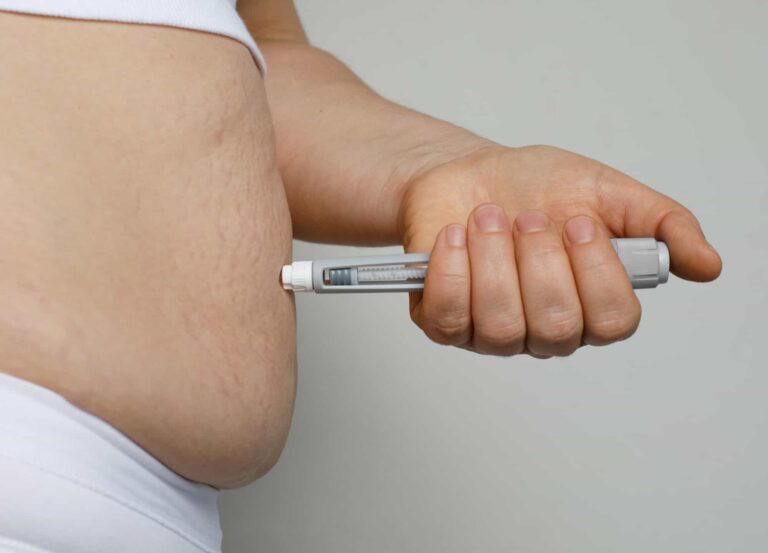For many people trying to lose a significant amount of weight, diet and exercise aren’t enough on their own. If you find yourself facing serious medical concerns and have already exhausted all other weight loss options, a major surgery may be the solution.
What classifies a weight loss surgery as major? According to Dr. Elizabeth Godshall, a bariatric surgeon with locations across New York, these procedures are all performed in a hospital, under general anesthesia, and involve making a physical change to a patient’s stomach and/or intestinal tract. While these are generally more effective than nonmajor weight loss surgeries, they also carry a number of risks—but more on those later.
At this time, there are four available options for major weight loss surgery, all of which are laparoscopic, or performed through several small incisions: sleeve gastrectomy, gastric bypass surgery, lap band, and duodenal switch.
“The sleeve gastrectomy is the most commonly performed major weight loss surgery,” says Dr. Godshall. “It involves dividing the stomach, to create a long, thin tube with a shape similar to [that of] a banana. This not only minimizes portion sizes, due to a decrease in the size of the stomach, but also minimizes hunger between meals, due to a decrease in the hunger hormone ghrelin.” Gastric bypass is a procedure that decreases stomach size and bypasses a portion of the intestinal tract. “This allows for both decreased portions as well as change in absorption capacity,” she says.
Lap band surgery involves a prosthetic band buckled around the upper portion of the stomach in order to restrict portion sizes. “The gastric band is later adjusted, in-office, via a port beneath the skin of the abdominal wall,” says Dr. Godshall. “These adjustments allow the degree of restriction to be customized to each patient.” Finally, the duodenal switch is a procedure that involves both a sleeve gastrectomy and an intestinal bypass. “This procedure is particularly effective for patients with a higher BMI,” she says.
Each of these surgeries allows patients to experience significant weight loss that can be sustained over time. For example, sleeve gastrectomy can help patients lose 60–70% of their excess weight. But as mentioned earlier, they carry some pretty heavy risks as well. “Specific to bariatric surgery, a leak or bleed from the cut edges or connection points created at the time of surgery is a primary concern,” she says. “There is also a risk for complications following the procedure that patients would [face] after any other surgical procedure, including infection or anesthesia reaction.”
While the risk of bleeding, infection, and even death is very real, Dr. Joseph Naim, a bariatric surgeon in Culver City, California, stresses that the chances of encountering these issues are quite low. Still, due to these risks, surgeons require a pretty extensive workup for patients before surgery, to ensure the procedure is done as safely as possible.
While all available options differ in terms of procedure, the general checklist of everything required to do before you get approved and how to prepare for bariatric surgery generally remains the same. Before you can even consider any of them, you’ll need to first fall into the appropriate BMI range.
As Dr. Godshall explains, all patients must meet the National Institute of Health’s body mass index (BMI) criteria in order to be approved for surgery. (It’s also worth noting that your current BMI may play a role in exactly what type of pre-op diet for bariatric surgery your doctor requires.) “For patients with a BMI between 35 and 40, the presence of a comorbid condition is required,” she says. “A patient must carry a diagnosis of diabetes, hypertension, sleep apnea, or heart disease. While there are other conditions associated with weight, these are the only four that insurance companies will consider for approval.”
However, if you have a BMI above 40, no comorbid condition is required, she explains. Also, patients with a BMI above 32 who also have one of the four comorbid conditions may be approved for lap band surgery, but it will depend on the patient’s insurance carrier.
There are many tests and evaluations between your initial consultation and actually getting approved and scheduled for surgery; patients are expected to complete a comprehensive workup prior to surgery in order to best prep them as well as identify any areas of additional risk. You’ll also need to follow a dedicated diet before bariatric surgery.
Ahead, experts share how to prepare for bariatric surgery, no matter the specific type it is. Keep reading for details on the pre-op appointments you’ll need to schedule and how to plan on adjusting your diet before weight loss surgery.
Dietitian consultation
One of the first steps you’ll be required to take before undergoing any major weight loss surgery is meeting with a dietitian, to evaluate your eating habits. “This is to get a history of what the patient has been eating, what their diet is like, and if they’ve tried any weight-loss-focused diets (such as Jenny Craig or Weight Watchers)—and if so, how much they’ve lost,” explains Dr. Naim. The dietitian will also help you adjust your current eating habits and calorie intake and come up with a dietary plan that will meet your personal needs after the bariatric procedure. A gastric bypass post-op diet (or one for any type of weight loss surgery, for that matter) is very specific and likely extremely different from your current one.
This evaluation doesn’t necessarily mean that your dietitian will require you to reach any type of weight loss goals or put you on some kind of pre-bariatric surgery diet, though it’s possible. Dr. Godshall says that her practice doesn’t routinely require any pre-op weight loss, though a patient’s surgeon may make specific pre-surgery diet requests on a case-by-case basis. (You will, however, need to go on a special liquid diet for bariatric surgery beforehand, more on that in a moment.)
Psychological evaluation
In order to be cleared for surgery, you’ll also need to meet with a psychologist and undergo a psychological evaluation. “This is more of a screening,” says Dr. Naim. “The patients are evaluated to see if there is any history of eating disorders, like bulimia or food addiction, as well as any major psychological concerns, like bipolar disorder, depression, or suicidal ideation.” If the patient suffers from any of these mental health concerns (or has in the past), this doesn’t necessarily mean they won’t be considered candidates for surgery. “We check to make sure they have them under control and make sure they’re complying with any prescribed medication so that they won’t run into any issues after surgery,” he says.
Major weight loss surgery is, well, major, and it will require some pretty dramatic changes to your lifestyle, both in preparation for and after surgery. The psychologist will also better prepare you for the necessary postoperative weight loss plans and lifestyle changes or determine if you need to be better educated and prepared prior to surgery.
Testing by an internist or specialist
Next, you’ll need to undergo basic tests in order to be cleared for surgery. Who you meet with may vary from office to office; Dr. Godshall’s patients must be evaluated by a cardiologist and pulmonologist, whereas Dr. Naim’s patients will meet with an internist for evaluation.
Regardless of what kind of doctor you meet with, you’ll have the same preoperative tests and screenings. As Dr. Naim explains, all patients will need a routine blood test, a complete blood count, an electrolyte panel, an EKG, and chest X-rays, which he says are the standard for any surgery that involves anesthesia. “Even in the case of a facelift, you’ll need to check for any underlying heart or lung problems.”
If you have specific underlying conditions, you may need to get other evaluations. “If the patient has other issues, like heart problems, diabetes, or high blood pressure, we might issue tests like an echocardiogram, a stress test, or a more invasive test like a coronary angiogram, to make sure that their heart is strong enough to undergo surgery,” says Dr. Naim.
If test results aren’t satisfactory for surgery, Dr. Naim says, other measures may need to be taken before they can proceed. “They may need to have their medication corrected, or in some cases—such as if the patient has coronary heart disease—they may need to have heart surgery before they can have weight loss surgery.”
In any case, Dr. Godshall explains that these consultations and tests aren’t meant to exclude any patients from being able to undergo surgery but rather to ensure surgery is as safe as possible.
Upper endoscopy
According to Dr. Godshall, an upper endoscopy (also known as an esophagogastroduodenoscopy, or EGD) is also required. An EGD is a procedure where an endoscope—a thin hose with a tiny camera attached—is inserted through the mouth and fed down the throat into the esophagus, stomach, and upper gastrointestinal tract while the patient is under sedation.
During this procedure, your doctors will be looking at the interior linings of the esophagus, stomach, and the first part of the small intestine, to check that you don’t suffer from gastroesophageal reflux disease, a hiatal hernia, bacterial infections, ulcers, or tumors.
While this will vary from office to office, Dr. Godshall explains that you may be able to meet with all the above healthcare providers and receive your endoscopy during the same appointment, to allow for a one-day surgical clearance, making the process much less daunting.
A pre-surgery liquid diet
Once you’ve completed the above and your surgery is approved and scheduled, you’ll be required to undergo a liquid diet leading up to your procedure—a dedicated bariatric surgery pre-op diet, as it were. “This helps get patients accustomed to the postoperative diet and decreases liver size, to make the surgical procedure more straightforward,” says Dr. Godshall.
Liquid diets include clear liquids (water, diluted fruit and vegetable juices, broth-based soups); full liquids (hot cereals, creamed soups, yogurts, milk); and daily protein shakes as well as several supplements, such as multivitamins, calcium, and vitamin D, but no solid foods.
While oftentimes a two-week liquid diet is recommended, this can vary depending on your surgeon, the type of bariatric procedure you’re having, and your current BMI. For example, a gastric sleeve pre-op diet or gastric bypass pre-op diet may include a longer period of cutting back on things such as carbohydrates, sugar, dairy, and alcohol and focusing on easy-to-digest, high-protein foods. This pre-bariatric surgery diet may last as long as four weeks, and involve switching to liquids only for a few days prior to the procedure. Still, at the end of the day, the specifics of your bariatric surgery diet plan—both before and after the surgery itself—will be dependent based on your particular situation.
The bottom line:
It’s imperative to understand that undergoing a major weight loss procedure requires many steps before final approval and will involve significant lifestyle changes, both pre- and post-surgery, in order to reduce the chance of any life-threatening risks and other issues. (It’s why properly preparing for bariatric surgery is so important.) But it’s also highly effective and may be the best—or only—option for some. “It’s an important option for patients to achieve significant and durable weight loss that cannot be afforded by a diet and exercise plan alone,” says Dr. Godshall. “Patients who qualify benefit not only from resolving a current diagnosis such as diabetes or obstructive sleep apnea but also by decreasing the risk of developing other medical conditions over time. Obesity affects so much more than an individual’s physical health—social and psychological health are impacted as well.”











